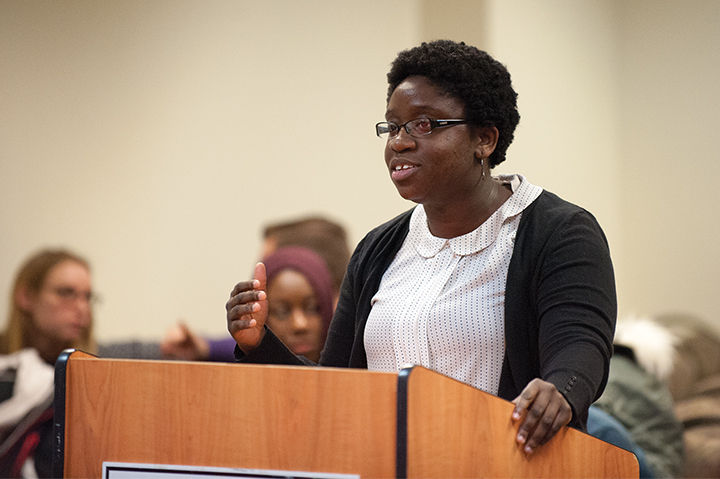
Charmaine Wilson-Jones, Vice President for Academic Affairs, speaks at the SGA Meeting in the Benjamin Banneker room of Stamp Student Union on January 28, 2015.
The SGA unanimously passed a resolution Wednesday condemning The Diamondback’s advertising department for publishing advertisements the governing body deems harmful to students at the University of Maryland.
The final vote was 20-0 in favor, with no abstentions.
The resolution focuses specifically on advertisements from FLAME — Facts & Logic About the Middle East — an interest group that “perpetrates Islamophobia and anti-Arab sentiment,” according to the Student Government Association resolution.
The resolution demands The Diamondback issue a formal apology to the student body “to amend for the years of hurtful and traumatic advertisements,” as well as cease publishing future FLAME advertisements.
“We’re just trying to say, ‘This is hate speech, and we’d appreciate it if you don’t publish negative ads in the future,’” SGA President Patrick Ronk said after the vote. “Putting anti-Arab ads in a student newspaper … I just don’t think it’s the place for that.”
Students speaking on behalf of the Muslim Students Association, Students for Justice in Palestine, UMD Social Justice Coalition and UMD Socialists also attended the meeting to share stories and express their support for the resolution.
“I’ve seen all kinds of things growing up here, and you make strides and you make relationships with people and make friendships, and then something happens that takes you steps back,” said Omar Khan, a senior business management major and MSA president. “To see something in a newspaper that’s against who you are or hateful toward you, that’s like taking three steps back.”
Junior Shannon Gallagher, the SGA representative from the journalism school, was unable to attend the meeting. She said she was disappointed her point of view was not heard because of her absence.
“I understand how much of a privilege it is that we have freedom of speech and the ability to speak our minds,” the journalism major said. “Starting to censor things is not conducive to … what [The Diamondback] is trying to do.”
This is not the first time the SGA passed a resolution urging the discontinuation of FLAME advertisements. The SGA unanimously passed a similar resolution in 2011.
Since then, The Diamondback has continued to publish about one FLAME advertisement per month, as it has done fairly consistently since 2008, said Victoria Checa, The Diamondback’s advertising director.
Checa said she wasn’t aware of any controversy regarding the FLAME advertisements until recently.
“In the three or two months that I’ve been here, I’ve gotten maybe two emails, and it’s all been, ‘SGA’s going to do something, what do you have to say?’” Checa said.
Shane James, a sophomore history and secondary education major, spoke on behalf of the other three organizations and said 24 student groups on the campus are opposed to the FLAME ads. A change.org petition calling for The Diamondback to stop publishing the advertisements has 205 signatures.
The students opposed will continue fighting despite the lack of results from the prior resolution, said James, who is also the president of Students for Justice in Palestine.
“Hate speech is not welcome on our campus. [The Diamondback] doesn’t have any obligation to continue this business relationship with this organization,” James said. “We will continue this fight until the ads are removed from the student paper.”
The Diamondback’s general manager, Michael Fribush, said he hadn’t been directly contacted in years about the issue. He added that The Diamondback does not intend on making a public apology or discontinuing the FLAME ads, which have also been published in The Washington Post and The New York Times.
“There are people who have concerns about any number of ads we run that don’t meet their viewpoint or their morals,” Fribush said.
Fribush added that The Diamondback, which publishes a host of other controversial ads — such as gentlemen’s club, and ads on both sides of the abortion debate — is not advocating ads opposing any one of the advertisements it publishes.
“I’m giving those people freedom of the press; that’s what this country is all about and that’s what newspapers are all about,” Fribush said. “This is a college-aged audience here. … Someone’s presenting facts to you, and you make up your own mind whether you agree with them or not.”



